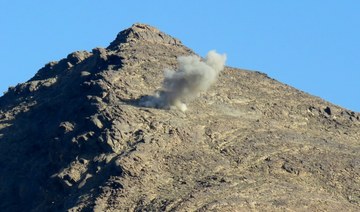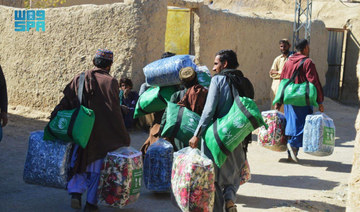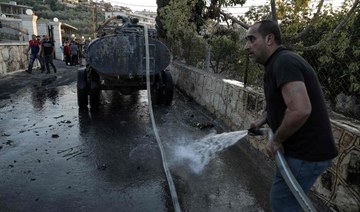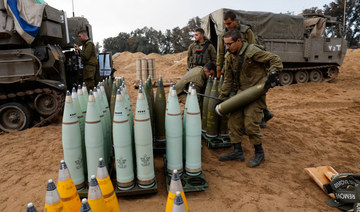RIYADH: The Arab coalition said on Thursday it carried out strikes on a legitimate air target in Sanaa, targeting a site of specific weapons that were transferred from Sanaa airport.
The coalition said the military strike in Sanaa was in accordance with humanitarian law and its rules, state TV reported.
Earlier on Thursday, the coalition said it carried out nine operations against militia targets in Marib in the past 24 hours, killing 45 fighters and destroying six military vehicles
Arab coalition targets air sites in Yemen’s Sanaa
https://arab.news/yysu4
Arab coalition targets air sites in Yemen’s Sanaa
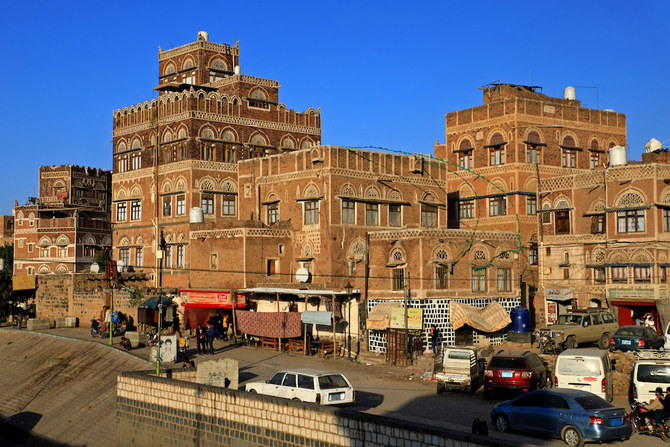
32 more killed in Gaza as Hamas studies new Israeli truce proposal
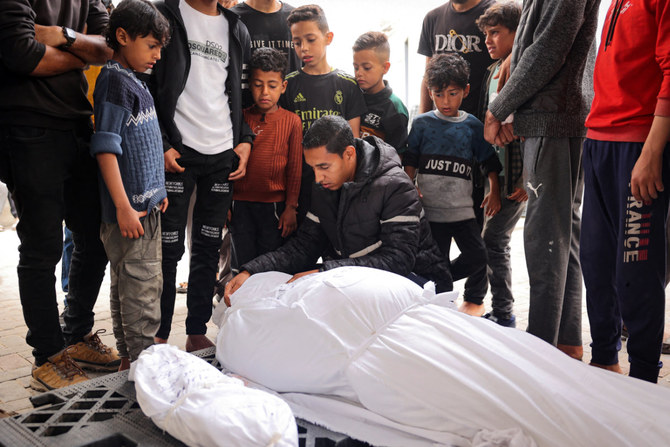
- Mediators working on compromise that will answer most of main demands
- Minister says Israel a deal could lead to suspension of planned Rafah offensive
JEDDAH/GAZA STRIP: Palestinians in Rafah said on Saturday they were living in “constant terror” as Israel vows to push ahead with its planned assault on the south Gaza city flooded with displaced civilians.
The Israeli military has massed dozens of tanks and armored vehicles in southern Israel close to Rafah and hit locations in the city in near-daily airstrikes.
“We live in constant terror and fear of repeated displacement and invasion,” said Nidaa Safi, 30, who fled Israeli strikes in the north and came to Rafah with her husband and children.
Gaza’s Health Ministry said at least 34,388 people have been killed in the besieged territory during more than six months of war between Israel and Hamas militants.
The tally includes at least 32 deaths in the past 24 hours, a ministry statement said, adding that 77,437 people have been wounded in the Gaza Strip since the war broke out when Hamas militants attacked Israel on Oct. 7.
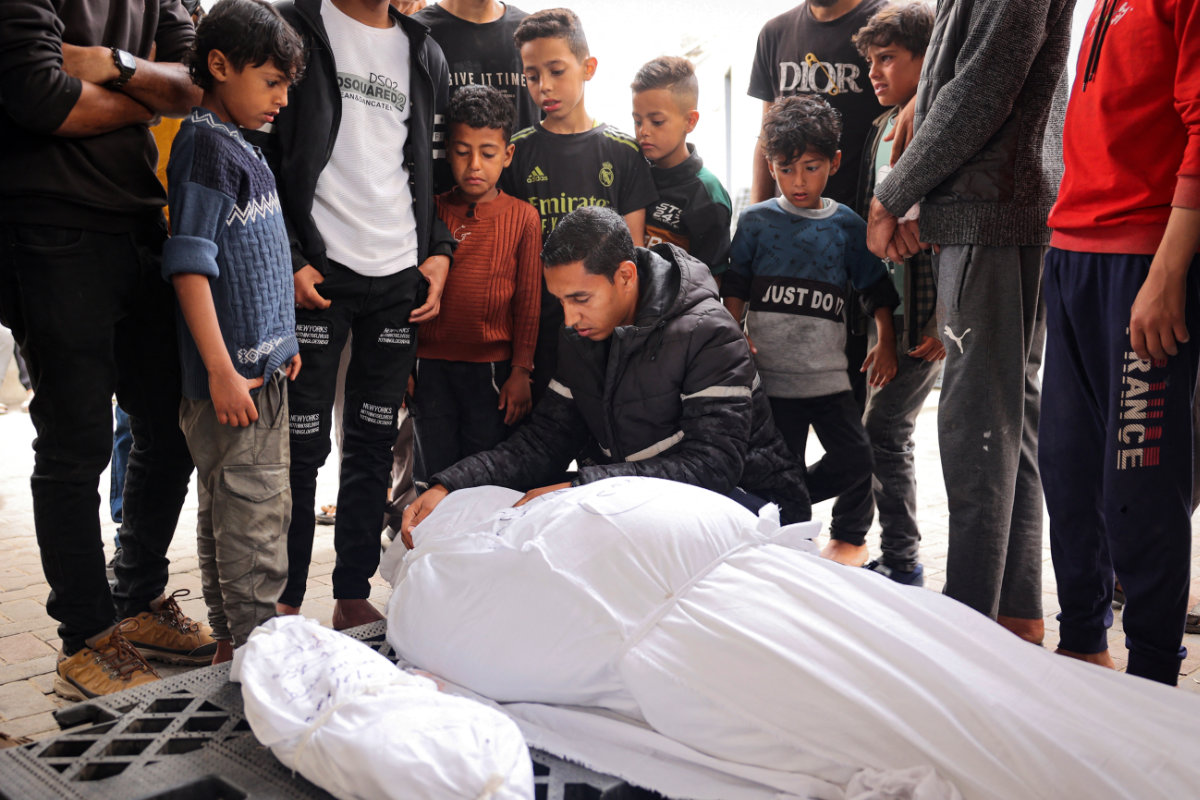
Early Saturday, an airstrike hit a house in Rafah’s Tel Sultan neighborhood, killing a man, his wife and their sons, ages 12, 10 and 8, according to records of the Abu Yousef Al-Najjar hospital’s morgue. A neighbor’s 4-month-old girl was also killed.
Ahmed Omar rushed with other neighbors after the 1:30 a.m. strike to look for survivors, but said they only found bodies and body parts. “It’s a tragedy,” he said.
An Israeli airstrike later Saturday on a building in Rafah killed seven people, including six members of the Ashour family, according to the morgue.
Five people were killed in the Nuseirat refugee camp in central Gaza overnight when an Israeli strike hit a house, according to officials at the Al-Aqsa Martyrs Hospital.
Elsewhere, Israeli forces shot and killed two Palestinian men at a checkpoint in the Israeli-occupied West Bank, the military said. It said the men had opened fire at troops stationed at Salem checkpoint near the city of Jenin.
Violence in the West Bank has flared since the war. The Ramallah-based Health Ministry says 491 Palestinians have been killed by Israeli fire.
Israel's counterproposal
Hamas said it was studying Israel’s latest counterproposal for a ceasefire, a day after reports said a delegation from mediator Egypt was in Israel trying to jump-start stalled negotiations.
Israel’s foreign minister said that the Rafah incursion could be suspended should there be a deal to secure the release of Israeli hostages.

“The release of the hostages is the top priority for us,” said Israel Katz. “If there will be a deal, we will suspend the operation.”
The Egyptian delegation discussed a “new vision” for a prolonged ceasefire in Gaza, according to an Egyptian official, who spoke on condition of anonymity to freely discuss the developments.
It wasn’t immediately clear whether Israel’s proposal was directly related to the visit.
Khalil Al-Hayya, deputy head of Hamas’s political arm in Gaza, said it had “received the official Zionist occupation response to the movement’s position, which was delivered to the Egyptian and Qatari mediators on April 13.”
Negotiations earlier this month centered on a six-week ceasefire proposal and the release of 40 civilian and sick hostages in exchange for freeing hundreds of Palestinian prisoners in Israeli jails.
A separate Hamas statement said leaders from the three main militant groups active in Gaza discussed attempts to end the war. It didn’t mention the Israeli proposal.
The armed wing of Hamas also released video footage of two men held hostage in Gaza, identified by Israeli campaign group the Hostages and Missing Families Forum as Keith Siegel and Omri Miran.
Mediators are working on a compromise that will answer most of both parties’ main demands, which could pave the way to continued negotiations with the goal of a deal to end the war, the official said.
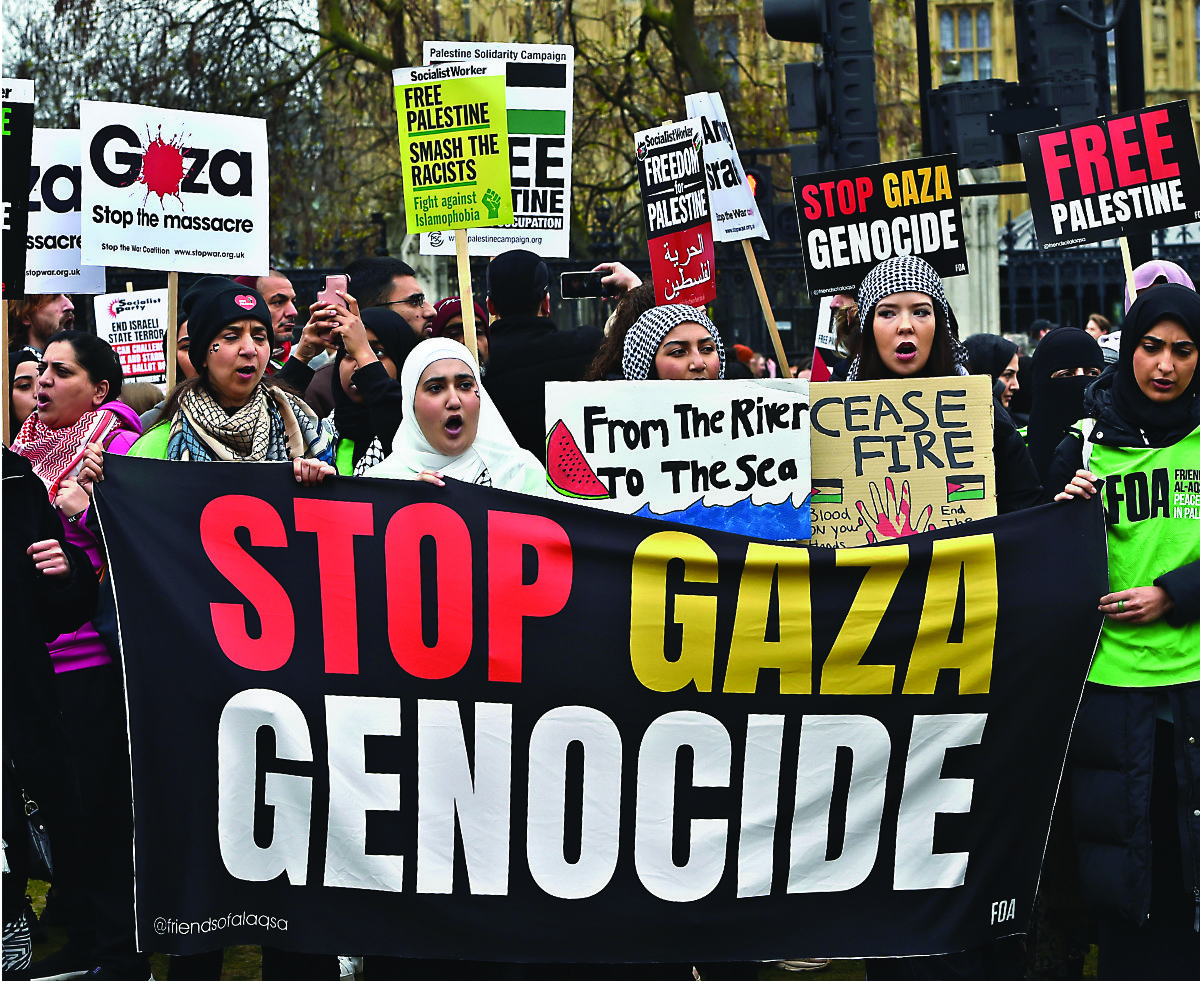
Hamas has said it won’t back down from demands for a permanent ceasefire and full withdrawal of Israeli troops.
Israel has rejected both and said it will continue military operations until Hamas is defeated and that it will retain a security presence in Gaza.
There is growing international pressure for Hamas and Israel to reach a ceasefire deal and avert an Israeli attack on Rafah, where more than half of Gaza’s 2.3 million people have sought refuge.
Israel has insisted for months it plans a ground offensive into Rafah, on the border with Egypt, where it says many remaining Hamas militants remain, despite calls for restraint including from Israel’s staunchest ally, the United States.
Egypt has cautioned an offensive into Rafah could have “catastrophic consequences” on the humanitarian situation in Gaza, where famine is feared, and on regional peace and security.
Tolerating Israeli abuses
Washington has been critical of Israeli policies in the West Bank. US Secretary of State Antony Blinken, who is expected in Israel on Tuesday, recently determined an army unit committed rights abuses there before the war in Gaza.
But Blinken said in an undated letter to US House Speaker Mike Johnson, obtained by The Associated Press on Friday, that he’s postponing a decision on blocking aid to the unit to give Israel more time to right the wrongdoing. Blinken stressed that overall US military support for Israel’s defense wouldn’t be affected.
The US has also been building a pier to deliver aid to Gaza through a new port. Israel’s military confirmed Saturday that it would be operational by early May.
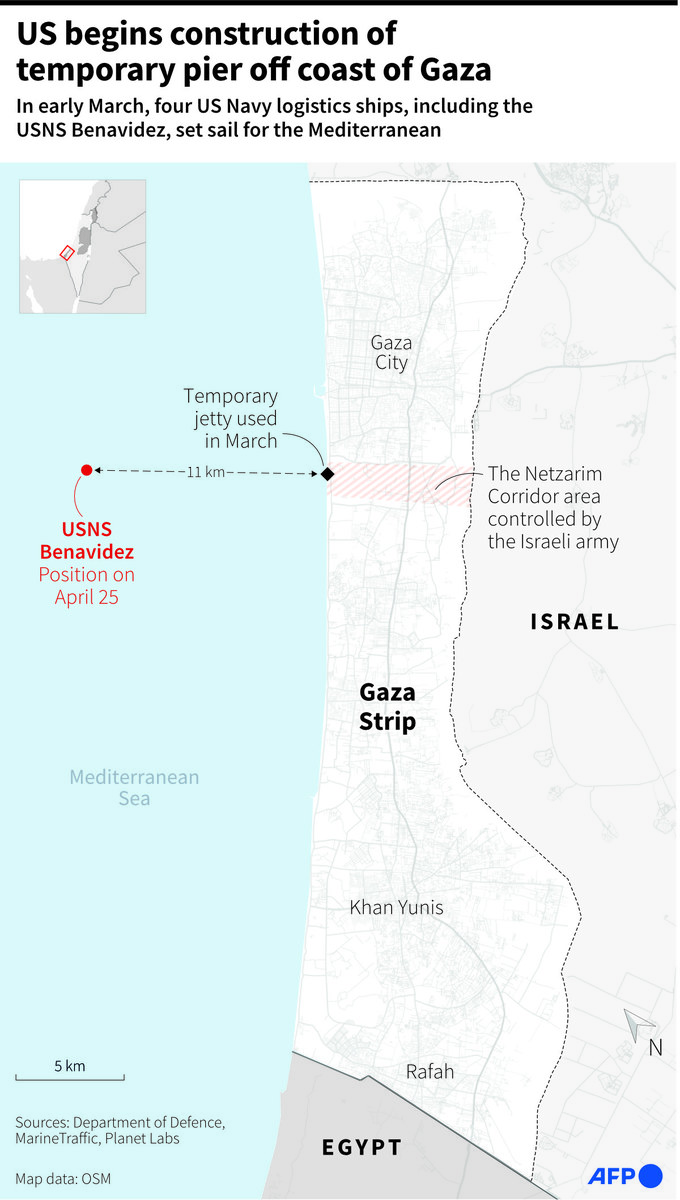
The BBC reported the UK government was considering deploying troops to drive the trucks to carry the aid to shore, citing unidentified government sources. British officials declined to comment.
Another aid effort, a three-ship flotilla coming from Turkiye, was prevented from sailing, organizers said.
Student protests over the war and its effect on Palestinians are growing on college campuses in the US, while demonstrations continue in many countries.
Hamas sparked the war by attacking southern Israel on Oct. 7, with militants killing around 1,200 people, mostly civilians, and taking around 250 hostage. Israel says the militants still hold around 100 hostages and the remains of more than 30 others.
Sudan demands emergency UN meeting on UAE ‘aggression’
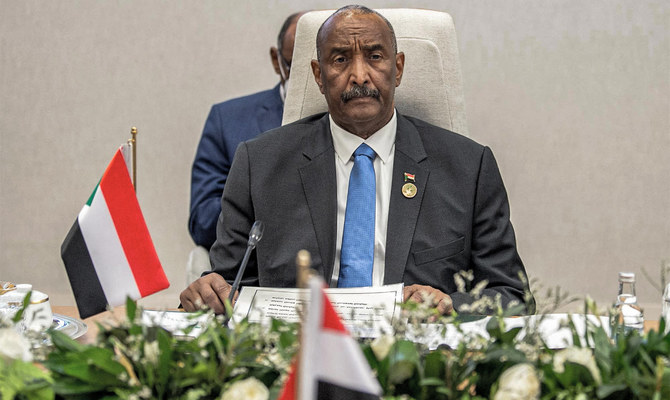
- For months the regular army has accused the United Arab Emirates of supporting the RSF, a charge the UAE denies
PORT SUDAN, Sudan: Sudan has requested an emergency UN Security Council meeting on what it calls UAE “aggression” for allegedly supporting paramilitaries battling the army, a diplomatic source said Saturday.
The fighting broke out in April last year between the regular army, headed by Sudan’s de facto leader Abdel Fattah Al-Burhan, and the paramilitary Rapid Support Forces (RSF) led by his former deputy Mohamed Hamdan Dagalo.
For months the regular army has accused the United Arab Emirates of supporting the RSF, a charge the UAE denies.
“Yesterday, our permanent representative to the United Nations submitted a request for an urgent session of the Security Council to discuss the UAE’s aggression against the Sudanese people, and the provision of weapons and equipment to the terrorist militia,” the source told AFP.
The country’s official SUNA news agency confirmed that Sudan’s UN representative, Al-Harith Idriss, had submitted the request.
SUNA cited Idriss as saying this was “in response to the UAE representative’s memorandum to the Council,” and that “the UAE’s support for the criminal Rapid Support militia that waged war on the state makes the UAE an accomplice in all its crimes.”
In a letter to the Security Council last week, the UAE foreign ministry rejected Sudan’s accusations that it backs the RSF.
The letter said the allegations were “spurious (and) unfounded, and lack any credible evidence to support them.”
Separately on Saturday, the UN Security Council expressed “deep concern” over escalating fighting in Sudan’s North Darfur region and warned against the possibility of an imminent offensive by the RSF and allied militias on El Fasher.
The city is the last Darfur state capital not under RSF control and hosts a large number of refugees.
United Nations officials put out similar warnings Friday, with the UN’s High Commissioner for Human Rights Volker Turk expressing his “grave concern.”
Secretary-General Antonio Guterres’ spokesperson’s office said an attack on El Fasher “would have devastating consequences for the civilian population... in an area already on the brink of famine.”
The Sudan war has killed tens of thousands of people and forced more than 8.5 million people to flee their homes in what the United Nations has called the “largest displacement crisis in the world.”
In December, Khartoum demanded that 15 Emirati diplomats leave the country after an army commander accused Abu Dhabi of supporting the RSF, and protests in Port Sudan demanded the expulsion of the UAE ambassador.
The Wall Street Journal, citing Ugandan officials, reported last August that weapons had been found in a UAE cargo plane transporting humanitarian aid to Sudanese refugees in Chad, prompting a denial from Abu Dhabi.
Hezbollah says fires drones and guided missiles at Israel
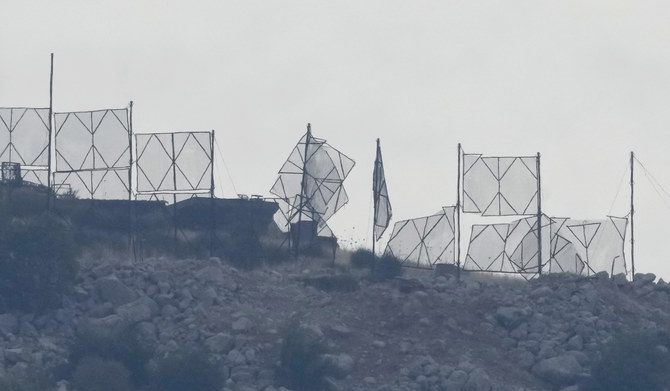
- The border between Lebanon and Israel has seen near-daily exchanges of fire since the Israel-Hamas war in Gaza began nearly seven months ago
BEIRUT: Lebanon’s Iran-backed Hezbollah movement said Saturday it had targeted northern Israel with drones and guided missiles after cross-border Israeli strikes killed three people, including two of its members.
A statement from the group said it “launched a complex attack using explosive drones and guided missiles on the headquarters of the Al Manara military command and a gathering of forces from the 51st Battalion of the Golani Brigade.”
The Israeli army said its Iron Dome air-defense system “successfully intercepted a suspicious aerial target that crossed from Lebanon into the area of Manara in northern Israel.”
The army also “struck the sources of fire” of several anti-tank missiles launched from Lebanon into the Manara border area, it added.
Lebanon’s National News Agency later reported that an Israeli air strike on a house in Srebbine village had wounded 11 people, one seriously.
Earlier Saturday, Israeli fighter jets “struck a Hezbollah military structure in the area of Qouzah in southern Lebanon,” the army said in a statement.
The border between Lebanon and Israel has seen near-daily exchanges of fire since the Israel-Hamas war in Gaza began nearly seven months ago.
In two separate statements earlier Saturday, Hezbollah mourned the deaths of two fighters from the villages of Kafr Kila and Khiam.
It said they had been “martyred on the road to Jerusalem,” the phrase it uses to refer to members killed by Israeli fire.
Hezbollah has intensified its targeting of military sites in Israel since tensions soared between Israel and Iran over the bombing of Tehran’s Damascus consulate on April 1, widely blamed on Israel.
US intel suggests Putin may not have ordered Navalny death in prison: WSJ

- The Russian prison service said that Navalny collapsed on February 16 after a walk at the isolated camp
WASHINGTON: US intelligence agencies believe that while the Russian president was ultimately responsible for the death of opposition leader Alexei Navalny, he didn’t order it to take place when it did, the Wall Street Journal reported Saturday.
The finding, which the Journal said was based on both classified intelligence and an analysis of public facts, raises new questions about Navalny’s death in a remote Arctic prison camp, which led to a new round of sanctions against President Vladimir Putin’s Russia.
Among those facts was the timing of the opposition leader’s death in mid-February, which overshadowed Putin’s reelection a month later.
While the new finding does not question Putin’s responsibility for Navalny’s death, the CIA and other US intelligence agencies believe he probably didn’t order it “at that moment,” the Journal said, quoting people familiar with the matter.
It said that some European officials, briefed on the US finding, were skeptical that the 47-year-old dissident could have been targeted without Putin’s prior knowledge, given the tight controls in today’s Russia.
President Joe Biden and several other world leaders have publicly expressed little doubt about the matter. “Make no mistake. Putin is responsible for Navalny’s death,” Biden said after the stunning news of the death emerged.
The Russian prison service said that Navalny collapsed on February 16 after a walk at the isolated camp. It said attempts to revive him failed.
Navalny had seemed relatively healthy and in good spirits when seen in a video just a day earlier.
A week before that, he reportedly had been the subject of high-level talks over a potential prisoner swap that could have freed him.
Navalny had been serving a 19-year prison sentence on charges he and his backers insist were fabricated.
He had earlier survived a poisoning that US and other investigators blamed on the Kremlin. Russian officials have denied culpability in the poisoning or in his death.
A number of prominent Kremlin opponents have died, been jailed and or forced into exile in recent years.
Reached by AFP, the National Security Council declined to comment on the report.
Some US officials say in internal memo Israel may be violating international law in Gaza
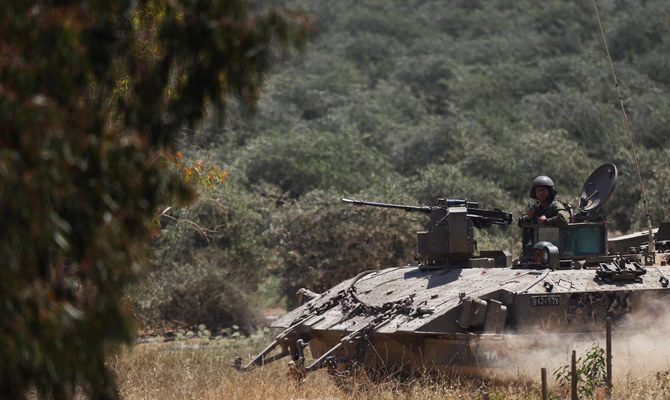
- The submissions to the memo provide the most extensive picture to date of the divisions inside the State Department over whether Israel might be violating international humanitarian law in Gaza
WASHINGTON: Some senior US officials have advised Secretary of State Antony Blinken that they do not find “credible or reliable” Israel’s assurances that it is using US-supplied weapons in accordance with international humanitarian law, according to an internal State Department memo reviewed by Reuters.
Other officials upheld support for Israel’s representation.
Under a National Security Memorandum (NSM) issued by President Joe Biden in February, Blinken must report to Congress by May 8 whether he finds credible Israel’s assurances that its use of US weapons does not violate US or international law.
By March 24, at least seven State Department bureaus had sent in their contributions to an initial “options memo” to Blinken. Parts of the memo, which has not been previously reported, were classified.
The submissions to the memo provide the most extensive picture to date of the divisions inside the State Department over whether Israel might be violating international humanitarian law in Gaza.
“Some components in the department favored accepting Israel’s assurances, some favored rejecting them and some took no position,” a US official said.
A joint submission from four bureaus — Democracy Human Rights & Labor; Population, Refugees and Migration; Global Criminal Justice and International Organization Affairs – raised “serious concern over non-compliance” with international humanitarian law during Israel’s prosecution of the Gaza war.
The assessment from the four bureaus said Israel’s assurances were “neither credible nor reliable.” It cited eight examples of Israeli military actions that the officials said raise “serious questions” about potential violations of international humanitarian law.
These included repeatedly striking protected sites and civilian infrastructure; “unconscionably high levels of civilian harm to military advantage“; taking little action to investigate violations or to hold to account those responsible for significant civilian harm and “killing humanitarian workers and journalists at an unprecedented rate.”
The assessment from the four bureaus also cited 11 instances of Israeli military actions the officials said “arbitrarily restrict humanitarian aid,” including rejecting entire trucks of aid due to a single “dual-use” item, “artificial” limitations on inspections as well as repeated attacks on humanitarian sites that should not be hit.
Another submission to the memo reviewed by Reuters, from the bureau of Political and Military Affairs, which deals with US military assistance and arms transfers, warned Blinken that suspending US weapons would limit Israel’s ability to meet potential threats outside its airspace and require Washington to re-evaluate “all ongoing and future sales to other countries in the region.”
Any suspension of US arms sales would invite “provocations” by Iran and aligned militias, the bureau said in its submission, illustrating the push-and-pull inside the department as it prepares to report to Congress.
The submission did not directly address Israel’s assurances.
Inputs to the memo from the Office of the Special Envoy to Monitor and Combat Antisemitism and US ambassador to Israel Jack Lew said they assessed Israel’s assurances as credible and reliable, a second US official told Reuters.
The State Department’s legal bureau, known as the Office of the Legal Adviser, “did not take a substantive position” on the credibility of Israel’s assurances, a source familiar with the matter said.
State Department spokesperson Matthew Miller said the agency doesn’t comment on leaked documents.
“On complex issues, the Secretary often hears a diverse range of views from within the Department, and he takes all of those views into consideration,” Miller said.
MAY 8 REPORT TO CONGRESS
When asked about the memo, an Israeli official said: “Israel is fully committed to its commitments and their implementation, among them the assurances given to the US government.”
The White House did not respond to a request for comment.
Biden administration officials repeatedly have said they have not found Israel in violation of international law.
Blinken has seen all of the bureau assessments about Israel’s pledges, the second US official said.
Matthew Miller on March 25 said the department received the pledges. However, the State Department is not expected to render its complete assessment of credibility until the May 8 report to Congress.
Further deliberations between the department’s bureaus are underway ahead of the report’s deadline, the US official said.
USAID also provided input to the memo. “The killing of nearly 32,000 people, of which the GOI (Government of Israel) itself assesses roughly two-thirds are civilian, may well amount to a violation of the international humanitarian law requirement,” USAID officials wrote in the submission.
USAID does not comment on leaked documents, a USAID spokesperson said.
The warnings about Israel’s possible breaches of international humanitarian law made by some senior State Department officials come as Israel is vowing to launch a military offensive into Rafah, the southern-most pocket of the Gaza Strip that is home to over a million people displaced by the war, despite repeated warnings from Washington not to do so.
Israel’s military conduct has come under increasing scrutiny as its forces have killed 34,000 Palestinians in Gaza, according to the enclave’s health authorities, most of them women and children.
Israel’s assault was launched in response to the Hamas attack on Israel on Oct. 7, in which Israel says 1,200 people were killed and 250 others taken hostage.
The National Security Memorandum was issued in early February after Democratic lawmakers began questioning whether Israel was abiding by international law.
The memorandum imposed no new legal requirements but asked the State Department to demand written assurances from countries receiving US-funded weapons that they are not violating international humanitarian law or blocking US humanitarian assistance.
It also required the administration to submit an annual report to Congress to assess whether countries are adhering to international law and not impeding the flow of humanitarian aid.
If Israel’s assurances are called into question, Biden would have the option to “remediate” the situation through actions ranging from seeking fresh assurances to suspending further US weapons transfers, according to the memorandum.
Biden can suspend or put conditions on US weapons transfers at any time.
He has so far resisted calls from rights groups, left-leaning Democrats and Arab American groups to do so.
But earlier this month he threatened for the first time to put conditions on the transfer of US weapons to Israel, if it does not take concrete steps to improve the dire humanitarian situation in Gaza.



